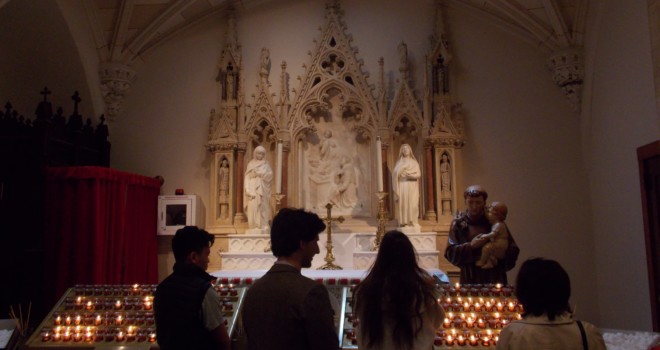“Do you know what we’re doing in writing these pages? We’re removing the false idea that this intimate life of the soul is possible only for the religious in the cloister. In reality my secret and tender love is for every human being living in the world” (p.293).
This is a quote from a book called He and I, written down by French laywoman, nurse, and mystic, Gabrielle Bossis, who recounts the words of Jesus that she heard as inner locutions. Ms. Bossis, who lived from 1874 to 1950, and in her sixties began having an interior mystical-dialogue with Jesus. Her journal is a recording of this miraculous intimate conversation.
Pauline Books and Media has just released a daily devotional guide, Jesus Speaking: Heart to Heart with the King, featuring quotes from Ms. Bossis’ book.
It should be noted that Bossis’
writing falls under the domain of “private revelation” that no one is
obliged to believe or follow, as the Catechism states: “Throughout the
ages, there have been so-called ‘private’ revelations, some of which have been
recognized by the authority of the Church. They do not belong, however, to the
deposit of faith” (CCC 67). That is to say, private revelation must never
contradict the deposit of faith, and even if it does not contradict the faith,
it still does not necessarily need to be believed or followed by the faithful. The
majority of private revelations are false. I do not believe the Church has ever
made an official declaration on her writing, although it has an Imprimatur from Msgr. Jean-Marie
Fortier, Archbishop of Sherbrooke, Quebec from November 14, 1969.
That being said, I believe it is possible
that these are the words of Our Lord to Ms. Bossis. In my humble opinion, they ring
true. I first read He and I a number
of years ago and was moved by it. It paints a portrait of Jesus as an extremely
loving and empathetic Creator who is deeply concerned about the most intimate
details of each person’s life. For example, Jesus tells Gabrielle on March 6,
1947:
“I need each one of you as though you were the only person in the world, as though the cosmos had been created for you alone . . .” (p. 193).
Jesus instructs Gabrielle on how
to live every day for the Lord and consecrate every action to him. We are all
called to live holy lives (1 Pet. 1:16). One of the ways we live holy lives is
by actively participating in the sacraments, as he addresses Gabrielle on March
5, 1948:
“My invitations are sent out at Baptism and again in my sacraments. It is for you to respond even though imperfectly” (p. 220).
In regard to the Eucharist, Jesus
tells Gabrielle on May 27, 1948:
“The thirst for union with you is so great that I want to be consumed by you in order to merge our minds, our beings. I want to be your thinking and your doing” (p. 229).
On October 11, 1940, Jesus
reminds Gabrielle, who was an actress, that we are all performing our actions
on a grand stage before Heaven, and the saints, and angels:
“What a spectacle for Heaven! Because you are all performing before the angels and saints. You see, you are still on the stage” (p. 67).
We are to live our lives in daily
unity with Christ. We can unite our ordinary mundane lives with his life in the
past. Jesus lived the life of the God-man in ordinary circumstances, and so by
doing, he divinized ordinary actions and supernaturalized ordinary life. The
Catechism attests to this:
“The hidden life at Nazareth allows everyone to enter into fellowship with Jesus by the most ordinary events of daily life” (CCC 533).
Jesus tells Gabrielle the same
thing on May 23, 1946:
“I ask my children for the most ordinary actions: eating, drinking, sleeping, working, your whole day united with mine in the past, your actions dipped in my blood and clothed in my merits. There is nothing difficult about this; it heals you of your usual poverty and wraps you in the richest garment. Acquire the habit by gazing at me as I gaze at you” (p. 176).
Jesus tells Gabrielle to practice
the morning offering and to offer him things throughout the day from our daily
routines. He tells her on October 15, 1943:
” . . . but in the morning say, ‘Everything will be for you, my great friend.’ Then from time to time during the day, a little word such as, ‘This is for you.’ It will warm your heart and bring balm to mine” (p. 118).
On the same day, he spoke about making
atonement for sinners. This is the symbiotic relationship of the communion of
the saints. We are baptized into Christ’s Mystical Body and are mediators and
intercessors as part of his priestly people (1 Pet. 2:9). Jesus tells Gabrielle
that we should do our part for the salvation of sinners by offering him
everything in our lives:
“My child, don’t lose a single minute. Time is short for saving so many souls. It is not merely by praying that they are saved, you know, but through the actions of even the most ordinary lives lived for God. Offer me everything. Absolutely everything, united to My life on earth. What wealth! Give it to poor sinners, most of them are just ignorant. You have known and received so much. Take pains to help them. You will comfort this heart of mine so full of tenderness, and you will satisfy justice. Offer me all the crosses of the world” (p.117-118).
Indeed, we can offer up our
sufferings, in conjunction with Christ’s Passion (Col. 1:24), for the sake of
sinners in the world, as Jesus tells Gabrielle on July 11, 1946:
“You take your place in the sacrifice for which the crown is prepared. You play your part in the unfinished symphony of my passion. Love these last sufferings. They are part of your travel wardrobe. The most ordinary sufferings – heat, insects, unforeseen mishaps, petty annoyances that you offer me in expiation – are part of the harvest of the autumn of your life in this ever-marvelous springtime of love” (p.180).
Jesus the God-man had divine
foresight and knowledge of all of us and all that we would do in our lives, as
the Catechism states: “Jesus knew and loved us each and all during his life, his
agony and his Passion, and gave himself up for each one of us” (CCC 478).
Jesus made a similar statement to
Gabrielle on October 30, 1947:
“Any suffering that you offer me with love eases my sufferings. You know that I saw everything in advance, right to the end of the world” (p. 208).
Christ’s divine foreknowledge has
been expounded upon in papal encyclicals as well. Pope Pius XII wrote in 1943
on the Mystical Body of Christ:
“. . . in that vision all the members of his Mystical Body were continually and unceasingly present to him, and he embraced them with his redeeming love” (Mystici Corporis Christi, 75).
In his Passion, as Jesus beheld the
sin for all humanity for all time, he became “very sorrowful, even to death” (Matt. 26:38). In 1928,
Pope Pius XI wrote:
“Now if, because of our sins also which were as yet in the future, but were foreseen, the soul of Christ became sorrowful unto death, it cannot be doubted that then, too, already he derived somewhat of solace from our reparation, which was likewise foreseen . . . And so even now, in a wondrous yet true manner, we can and ought to console that Most Sacred Heart which is continually wounded by the sins of thankless men” (Miserentissimus Redemptor, 13).
Precisely because Jesus is the
God-man, we can ease his Passion in the past by our reparations and acts of
love and mercy in the present.
These are just a few excerpts from Gabrielle Bossis’ spiritual book. There are many more spiritual nuggets within. Prayer, the sacraments, sacrifice: this is all part of the intimate life of the soul. It is a good meditation on living a Christ-centered daily life.
✠
Photo by Mateus Campos Felipe on Unsplash












